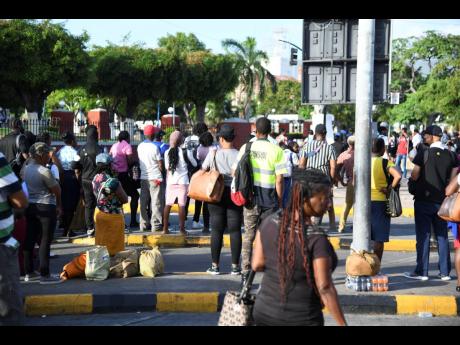Editorial | Problem not demerit points
As we observed 19 months ago when they went on strike to pressure the Government into providing an amnesty for their outstanding traffic tickets, Jamaica’s bus and taxi operators have a habit of barking up the wrong tree. Or, they do not focus on the most appropriate one.
They did it again this week, especially on Monday, when large numbers of transport operators withdrew their services, demanding a recalibration of the demerit points system for traffic offences. Hundreds of thousands of commuters were stranded across the country. Commerce was disrupted.
The demerit points issue may, indeed, be a legitimate concern for the operators of public passenger vehicles – and perhaps for most Jamaican drivers, who also face the risk of losing their right to drive if they break the law. However, in their sense of victimhood, the taxi operators conflate this with the deeper problems facing their industry and their inability to run viable and profitable operations.
The upshot: they quixotically flail at windmills, rather than insist upon an organised, and appropriately priced, public transportation sector. Which, of course, is the recipe for the ramshackle and disorder that pretends at being a modern commuter service in Jamaica’s towns and cities, especially the Kingston Metropolitan Region.
FEAR FOR THE OPERATORS
Regarding this week’s strike, the bus and taxi operators’ primary grouse – insofar as they have articulated it – is that demerit points are pitched too high for certain traffic offences, which means that they can quickly reach the threshold for the suspension of a driver’s licence, leading to the operator being chucked out of the public transportation system.
Under Jamaica’s year-and-a-half Road Traffic Act, a driver who accumulates 10 or more, but fewer than 14, demerit points will have his/her vehicle operating licence suspended for six months. Where 14 or more, but under 20 points have accumulated, the suspension is for a year. Anything over 20 points, the halt to the right to drive is for two years. The driver also has to be re-tested at the end of that time.
The fear for the operators (especially in the context of how they operate) is that the points can add up quickly, even without committing offences that carry the highest demerits. For instance, speeding can incur between three and 10 demerit points; careless driving, when a collision occurs, brings four points; reckless and dangerous driving, 10; reversing for more than two vehicles lengths in order to turn, four; overtaking in a manner that obstructs oncoming traffic, three demerit points.
These, as well as other offences in the schedule that attract demerit points, are common occurrences among Jamaica’s taxi and minibus drivers – including more than 30,000 taxis registered in the island – who regularly hustle against each other for passengers, seemingly oblivious of the road code. There are cases of a single driver having accumulated several hundred traffic tickets, and, in at least one case, more than 1,000.
The operators, though, often claim they are picked on by the police and transport regulators for the most minor infractions. However, a larger part of their problem, usually unarticulated and unexplored, is the overcrowding of the sector and the poor pricing of the service, which encourages the cut-throat mentality and corner-cutting that are rampant in the business. The government, across administrations, bears much of the blame for this.
STRUCTURE OF THE SYSTEM
Until bus/taxi fares were hiked by 15 per cent in August 2021, there was no increase for eight years. An additional 10 per cent due early in 2022 was however frozen.
Last October, the Government announced a compounded 38 per cent increase in fares, with the first tranche of 19 per cent taking immediate effect. That pushed the cost of a six-and-a-half kilometre bus or route taxi ride to $160 (US$1.02).
The second portion of the increase was to come into effect in April, at the start of the current fiscal year. The Government, however, persuaded industry leaders to agree to a freeze as an anti-inflation measure.
At the same time, the Government slashed fares on the state-owned Jamaica Urban Transit Company (JUTC) – which services the capital and its outskirts and added an extra $2 billion to the JUTC’s subsidy, driving taxpayers’ support for the company to over $11 billion.
Essentially, private transport operators have, for years, been forced to subsidise commuters. Their compensatory mechanism has been the poor and undisciplined service they provide, evidenced by their disregard for traffic laws and industry regulations, and propensity for the demerit points about which they now complain.
Put another way, while the demerit system may be as irrational as some critics, other than bus/taxi drivers, say it is not, fundamentally, what ails the transportation sector. Rather, it is the structure of the system itself.
In this regard, three things are urgent: the service must be properly priced and operators compensated accordingly (whether by commuters paying directly and via government subsidies); the authorities must insist that higher fares are matched by good service and accountability; and, as this newspaper has been proposing, the Government must formulate, and execute, a rational, long-term, multisectoral transportation policy.

